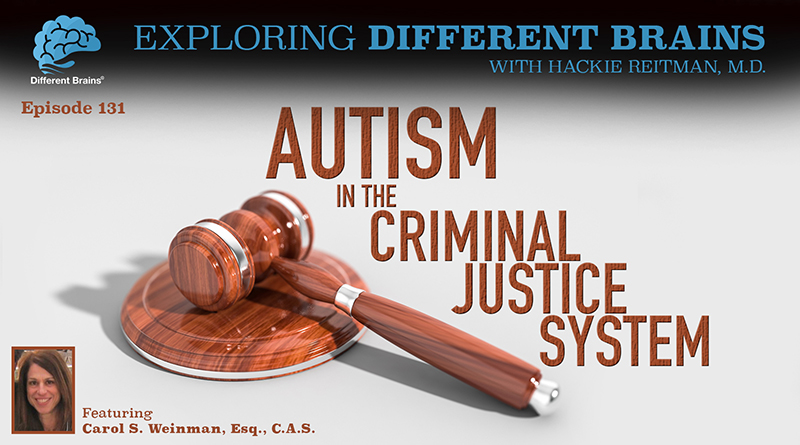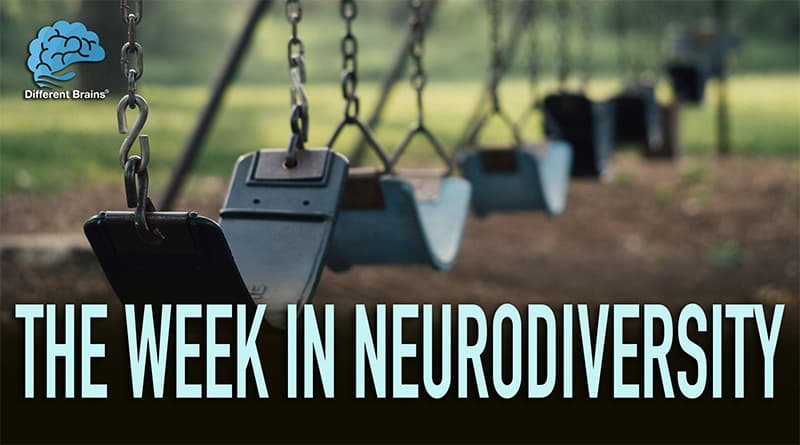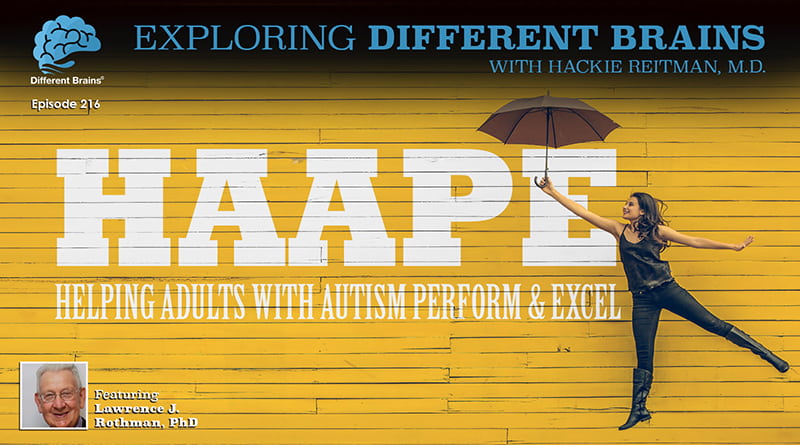
Autism in the Criminal Justice System, with Carol S. Weinman, Esq., C.A.S. | EDB 131
(16 mins) In this episode, Dr. Hackie Reitman speaks with criminal defense attorney and autism expert Carol S. Weinman, Esq., C.A.S.. Carol is a former Prosecutor and has been a criminal defense attorney and family lawyer for over 25 years. She focuses her law practice on special education and specializes in advocating for the interests of those with autism. Ms. Weinman is recognized as an autism expert and legal consultant, author, mediator, trainer and nationwide speaker on autism. She is passionately committed to educating others worldwide about understanding the autistic brain and behavior, and how autism plays a role in the commission of criminal offenses and inappropriate behavior. Carol discusses her experience as a mother to a son on the spectrum, the uniqueness of her position as both an expert in law and autism, and common ways people with the condition find themselves in trouble with the justice system.
For more about Carol: www.weinmanlawoffice.com
.
81 Second Preview:
.
To listen or download the podcast version of this episode, see the embedded player below.
Or look for us on your favorite podcast provider:
iTunes | Stitcher | SoundCloud
[expand title=”View Full Transcript”]
HACKIE REITMAN (HR): Hi, I’m Dr. Hackie Reitman. Welcome to another episode of Exploring Different Brains. Today we’re happy to have as our guest Carol Weiman. Carol is a former prosecutor, and she’s been a criminal defense attorney and a family lawyer for over 25 years. She focuses her law practice on special education and specializes in advocating for the interests of those with autism. Ms. Weinman is recognized as an autism expert and legal consultant, mediator, trainer, and nationwide speaker on autism. She is passionately committed about educating others worldwide about understanding the autistic brain and behavior, and how autism plays a role in the commission of criminal offenses and inappropriate behavior. Carol, welcome to Different Brains.
CAROL WEINMAN, ESQ., C.A.S. (CW): Good afternoon. Glad to be here.
HR: Thanks for being here. You know, in reading about you, you certainly are a champion of the underdog, and I want to salute you. I’m so glad that my friend, Philadelphia attorney Don Yablon went to one of your instructional courses and said, “Hackie, you’ve got to talk to her. She’s terrific.” Let’s start off by introducing yourself to our audience and telling them in your words exactly what you do.
CW: Well, as you said I’ve been a criminal attorney for over 25 years, and 22 years ago I gave birth to a son, one of twins, who ended up having autism spectrum disorder, and that’s what led me into this journey that I began in the world of autism. What happened was that the combination of my criminal law background and autism intersected, because unfortunately a lot of individuals on the autism spectrum are finding themselves in encounters with the criminal justice system. While I also advocate for those with special needs in the special education realm, what has become my specialty niche, and I believe I’m the only one in the country that has the dual expertise in the autism and the criminal law, so I’ve become an autism expert and autism legal consultant in the realm of criminal law. Educating the prosecutors, judges, police officers, I do trainings, I do international speaking on that topic and on other topics relating to autism, and I serve as an expert witness in the courtroom to assist a criminal attorney without the expertise on autism who may be representing an individual on the autism spectrum.
HR: Well, you know it’s very interesting. We interviewed William Packard, who wrote the book on neurodiversity within the prison and justice system. This is now coming into the fore, more and more, as you know. It amazes me that there’s not more knowledge on the part of doctors, on the part of lawyers, policemen, and society in general that all of our brains are different. When I was out in San Francisco with all the ASCEND people out there, Michael Bernick and his crew, I met with the San Francisco Police, who had combined with the ASCEND autism organization to make a video, which was great. Here you had an autistic individual looking into the camera and saying, “Look, I’m not trying to be rude, but I just can’t look into your eyes and I’m not trying to be a wiseguy.” Give us some examples you run into, for lack of a better term I’ll call it wrongful assumptions on the part of the police officers, not because they’re bad people, because they haven’t had the training, they don’t know.
CW: I’m really glad you asked that, Hackie, because that’s a lot of what I speak about. I often speak to the issue of demystifying the behavior and the behaviors that call attention to these individuals by the police officers. Oftentimes because their brains work differently, they often will do things inadvertently and unknowingly that call attention to them from a police officer. Some examples may be of cases, I’ve represented a lot of individuals on these cases as well as the attorney, and a lot of things I’ve come across are, for example, you may have an individual walking down the street and he or she, the bulk of them are males at this point, but he or she may have an odd gait, walking funny, and something about the way they walk or the way they’re acting calls attention to a police officer who happens to see this, and he’s looking, from their perspective, rather suspicious. They think there’s something going on here. Another example is that many of them are very, very curious. Their curiosity will often lead them into places that they shouldn’t be. For example, they may be peeking into a window that they shouldn’t be looking into, and a police officer thinks they are what we used to refer to as a “peeping Tom.” They may be staring at someone oddly, to a point that the person feels uncomfortable. They tend to find themselves in situations where they are accused of alleged harassment, stalking – which I’ve actually written on – because it looks like they are stalking an individual because they may be following them; they may be sitting and staring at them for a long time, and it makes people very uncomfortable. In terms of them actually calling attention to the police firsthand, it would be those kinds of behaviors, stimming. There was a big case in the news of an individual with what would call stimming, which means repetitive behavior that is not within their control. He was holding something and he kept twirling it, and the officer became very suspicious and approached him and thought he was doing something with drugs or he didn’t know what he was doing. These are some of the examples of how they are targeted unknowingly by police officers for things that they are not even aware that they are doing. The other area, unfortunately, that we find ourselves in with this population are sex offenses. Child pornography, sexual assault, and that’s a whole other area to speak on, because it has to do with the whole issue of theory of mind, which is that they cannot empathize and step into someone else’s shoes, and on the issue of sexual assault, there’s this whole issue of consent and the fact that they think that if they want to do it, they assume the other person’s thinking the same thing. So it branches out into a lot of different areas and can get rather complicated. What I have found my greatest challenge has been to be able to illuminate people and educate anybody out there; whether it be parents, whether it be psychologists; whether it be doctors; whether it be people in the law profession, of how their brains are so different. And primarily, Hackie, what I come up against a lot is to get them to understand that it’s not a mental illness. See, there’s provisions in the law for mental illness, but there aren’t provisions yet, we haven’t caught up with autism. It’s a developmental neurological disorder, and that’s very different than a mental illness, especially in the way that the law looks at it.
HR: So let’s say I’m a parent, and I have a child who gets arrested, and based on my limited knowledge, there are not Carol Weinmans on every corner. How many people are there that do what you do?
CW: I have to humbly tell you, Hackie, I’m it.
HR: Ok, so you’re now…
CW: There is nobody else at this time that has the expertise and knowledge and does what I do.
HR: But I’m wondering, like for our viewers here at different brains who might have one of their family who is on the spectrum who’s being arrested or going through the system what is your best advice to them as your best advice to say have your attorney contact Carol or someone like her who knows the ins and outs of this cause otherwise you’re going to have to reinvent the wheel
CW: Yeah, my best advice is as soon as your child is arrested or at the very beginning of the process you get a criminal attorney of your choice where you live and you then consider bringing me on board as the autism legal consultant who can handle the issue of autism and what is so important to understand about that hackie is that the entire case is about the autism, you see when a criminal attorney approaches a case they look at the person from the standpoint of a criminal defendant that’s one perspective but when you get someone with autism that is arrested as a criminal defendant in my opinion the entire case rests on the autism so that’s why you have to bring someone like me on board now I am doing, you know I’m getting more and more involved in training, the trainer you know so that I could get other people out there to understand but unfortunately it has taken me literally about twenty years to gain this knowledge and expertise from raising a child and from reading endlessly it’s very difficult to just have somebody else gain that level of expertise in a training session or whatever it’s a very complicated disorder and it has a lot of subtleties there are a lot of subtleties to autism so it is very difficult and I find it actually a little dangerous when someone has a little knowledge and tries to go out there and advocate for someone with autism because they don’t know what they don’t know and there are subtleties that come up so my best advice would be to get or call or contact me if I can’t do it maybe I can suggest something but I’m heartbroken when I get a lot of people that call me at the end of the case after the verdict and they get a really bad verdict it’s too hard to undo it it’s got to be done from the beginning and it has been heartbreaking to me because if you get a criminal attorney that represents someone with autism they will often be the first one to tell you that they are out of their comfort zone they have no idea what they’re dealing with and that case is just going to go in one direction they’re going to represent like they represent a defendant but honestly it’s getting to a point where I don’t even believe that’s effective counsel I think you’ve got to have somebody that understands autism when you get a client like- ….
HR: You know one of the shows we have on differentbrains.org is Spectrumly Speaking with Becca Lory and Dr. Katherine Cody? and Becca Lory is an adult female autistic individual who is very successful and she is on our board also and it seems that women get the short end of the stick so to speak when it comes to diagnosis, many of them are not diagnosed until into their thirty’s and so forth and I’m imagining that in the criminal justice system the preponderance are male but tell us about a female going through the criminal justice system
CW: Well, I have had contact with, you’re right it’s very much fewer, it is primarily male almost all of my clients, I will tell you about a female that I got that was really tragic. she ended up- the best way to explain it is she ended up shooting somebody to protect a child in her mind and in terms of your question of what it’s like for them to go through the system maybe the best way for me to answer that is that autism spectrum disorder looks very different in females and were still, I think, not totally in our infancy but very much in the inception period of understanding how it manifests in females and how many females are out there on the autism spectrum because they have gotten missed even more than males because of how it manifests itself, it’s much more, males tend just by the facts that they’re men to be more physical so it will come up in physical offenses and striking out at someone physically, that’s not what we see in females, and in females it’s much more subtle, so it’s often gotten missed, because they might just seem odd but nothing is really calling or putting them on the radar so we aren’t seeing as many females hackie that’s one of the few that I have actually come into contact with so far what I am seeing are a lot more females that are realizing that they have the disorder as an adult but in terms of coming into contact with the criminal justice system I’m not seeing a lot of that yet ** 5:25** (fortunately/unfortunately)? that can change, or their not identified I think they are in the prisons it’s one of the other things **5:34** (that is a part of my work?)
HR: If I’m a Different Brains viewer here and I see you or I’m listening to you on the podcast version of this or I’m reading the transcript version of this, how do I get ahold of you?
CW: The best way to get me right now would be through my website and email. My website is weinmanlawoffice.com. That’s my last name law office dot com, and you can reach me at c, s as in Sam, that’s my middle initial, Weinman at weinmanlawoffice.com. You can either reach me via email or there’s also a contact form on my website.
HR: Well, Carol, it’s been a pleasure. Thank you so much for being here at Exploring Different Brains. I hope we can see you again in the future as well.
CW: Thank you. I would love that. I’m very inspired by the work that you’re doing, and I feel very honored to be part of your programming.
[/expand]




